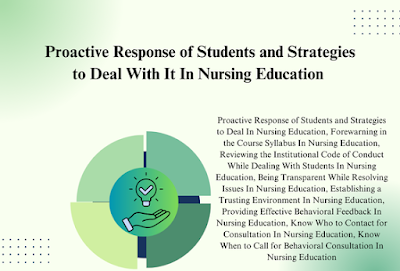The Proactive Response of Students and Strategies to Deal With It In Nursing Education. Strategies to Deal With It In Nursing Education Effectively managing student behavior in nursing education is critical for creating a conducive learning environment.
The Proactive Response of Students and Strategies to Deal With It In Nursing Education
Proactive strategies play a pivotal role in preventing inappropriate behavior and maintaining a productive educational atmosphere. This comprehensive guide provides a range of strategies to address and manage student behavior, applicable to traditional classrooms, off-campus settings, and online learning environments.
Within this conceptual analysis, proactive nursing was defined as a series of behaviors in the nursing process that utilize creative methods and diverse resources to identify or resolve underlying client problems.
Being proactive means taking control and making things happen, anticipating and preventing problems, and seizing opportunities. Emergency room nurses provide advanced nursing care that requires proactive behavior based on practical nursing experience.
Nurse educators should support and foster nursing students’ academic and clinical engagement through innovative educational strategies to enhance their knowledge and skills and improve the quality of clinical services provided.
1. Forewarning in the Course Syllabus
The course syllabus is a fundamental tool in setting clear expectations from the outset. Clearly outline behavioral expectations and academic goals to prevent potential issues. Assume that students may not inherently understand professional behavior norms; therefore, explicitly describe acceptable and unacceptable behaviors.
Include specifics about punctuality, participation, and other key aspects of student conduct. For instance, if arriving on time and staying for the entire duration of the class is essential, detail this requirement and explain its importance in achieving course objectives. Offer guidance on managing situations where students might be late or need to leave early, such as designated seating arrangements to minimize disruptions.
2. Reviewing the Institutional Code of Conduct
At the beginning of the course, take the opportunity to review the institutional code of conduct. Highlight the sections that are relevant to the course and discuss how these policies impact student behavior and academic integrity. Use examples to illustrate desirable behaviors and foster a discussion on maintaining a respectful and productive learning environment.
3. Being Transparent While Resolving Issues
Transparency in grading and assignment development helps mitigate misunderstandings and grievances. Clearly communicate the rationale behind grading decisions and course design to prevent perceptions of arbitrariness. Open communication about these aspects can reduce student frustration and potential disruptive behavior, particularly when addressing grades or clinical evaluations.
4. Establishing a Trusting Environment
Building a trusting relationship between faculty and students is essential for effective feedback and professional growth. Students may not always be receptive to constructive criticism if they do not understand its purpose. Clearly articulate the intent behind feedback and how it contributes to their professional development, fostering an environment where students can accept and act upon feedback positively.
5. Providing Effective Behavioral Feedback
In a supportive learning environment, it is crucial to provide specific and actionable feedback on student behaviors that may hinder their progress. Offer clear examples of desirable and undesirable behaviors, allowing students to understand and make necessary adjustments. If problematic behavior persists, address it more assertively to ensure it does not continue to disrupt the learning environment.
6. Knowing Who to Contact for Consultation
Faculty should familiarize themselves with key campus resources for managing student behavior. Institutions often have designated individuals or offices, such as the dean of students, counseling services, or campus police, who can provide assistance. Regularly update your knowledge of these resources and establish relationships with relevant personnel to effectively address behavioral concerns.
7. Knowing When to Call for Behavioral Consultation
Timely intervention is crucial when dealing with unresolved behavioral issues. If a student’s behavior consistently fails to meet established standards despite clear communication and initial interventions, consult with relevant campus authorities for additional support or referrals. Prioritize safety and well-being, and involve campus law enforcement if necessary to address any threats or safety concerns.
Conclusion
Implementing proactive strategies in nursing education helps create a structured and respectful learning environment. By clearly communicating expectations, being transparent, establishing trust, providing constructive feedback, and knowing when and whom to consult, faculty can effectively manage student behavior and foster a positive educational experience.
References
- Jones, J., & Philp, D. (2011). Effective Classroom Management: A Proactive Approach. Education Press.
- Luparell, S. (2004). Understanding and Managing Student Behavior in Nursing Education. Academic Press.
- Shanta, S., & Eliason, M. (2014). Building Trust and Providing Feedback in Nursing Education. Professional Development Journal.
Incorporating these strategies into your educational practices can significantly enhance the learning environment and support students’ professional development.
Read More:
https://nurseseducator.com/didactic-and-dialectic-teaching-rationale-for-team-based-learning/
https://nurseseducator.com/high-fidelity-simulation-use-in-nursing-education/
First NCLEX Exam Center In Pakistan From Lahore (Mall of Lahore) to the Global Nursing
Categories of Journals: W, X, Y and Z Category Journal In Nursing Education
AI in Healthcare Content Creation: A Double-Edged Sword and Scary
Social Links:
https://www.facebook.com/nurseseducator/
https://www.instagram.com/nurseseducator/
https://www.pinterest.com/NursesEducator/
https://www.linkedin.com/in/nurseseducator/
https://www.researchgate.net/profile/Afza-Lal-Din
https://scholar.google.com/citations?hl=en&user=F0XY9vQAAAAJ
